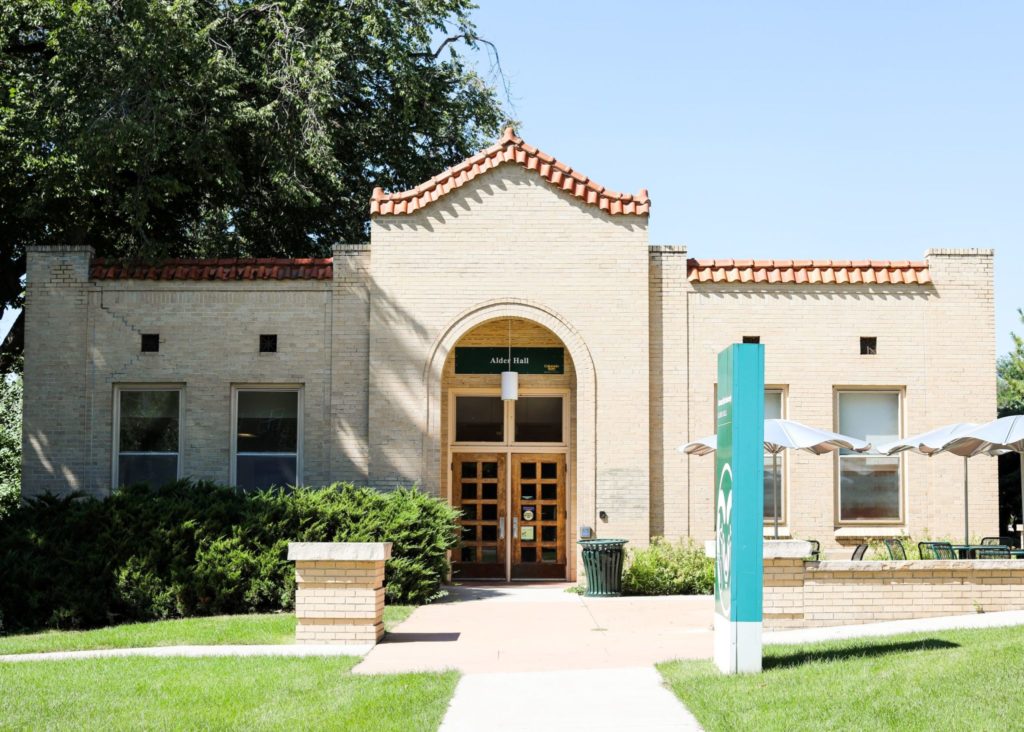
Alder Hall, the physical location of the CSU Prevention Research Center where faculty, staff, and students who work in prevention science collaborate.
After years in the making, a new Colorado State University Online master’s degree and graduate certificate in prevention science have started with a semester of success in the books. Beginning in Fall 2022, the programs offered by the Department of Human Development and Family Studies began to fill a gap in the prevention workforce, specifically in rural Colorado.
Prevention science focuses on best practices in developing, implementing, and continually assessing evidence-based strategies to prevent societal challenges including mental illness, drug and alcohol addiction, child abuse, interpersonal violence, obesity, poor nutrition, and more from occurring. People working in this field select and implement research-proven programs that improve the wellbeing of individuals, families, and communities.
Colorado’s need for employees with prevention science backgrounds
“Prevention practice is a fairly new field,” said Nathaniel Riggs, executive director of the Prevention Research Center and a primary contributor to the creation of this new program. “As a result, Colorado and the nation have a limited workforce of individuals who are trained in identifying, implementing, evaluating, and sustaining evidence-based prevention programs. And this shortage of trained professionals disproportionately affects rural communities since there are often limited resources and opportunities to train professionals located in their own communities. We are excited to share the latest research and best practices related prevention programs in a format that allows people to stay in their communities and grow in their professions.”
A market analysis conducted by Hanover Research for CSU Online indicated an anticipated employment growth rate of approximately 36 percent for prevention practitioners over the next 10 years in Colorado.
“I am also working with the Colorado Department of Public Health and Environment on how we can integrate these programs into Colorado’s state prevention certification process,” said Riggs. “It is clear the state also recognizes the need for more trained prevention practitioners in Colorado.”
Flexible, online education in prevention science
“After researching social science degrees, I came across CSU’s Master of Prevention Science Practice program and realized how much the ideals of this degree spoke to me,” said Erica Singh, a student part of the first cohort for the online Master of Prevention Science Practice degree. “For me, the online option is convenient and allows the freedom and autonomy to work at my own pace and on my own schedule.”
The online prevention science certificate and master’s degree are for individuals who want to learn more about prevention science, so they can be competitive for a prevention practice job in the future. It is also meant for those already in the field, or a related field, to help them build up their formal education in the prevention space.
“This is a program that can fit with a professional’s life,” said Julie Taylor-Massey, a co-coordinator of the CSU human development and family studies online program. “It is attainable for people in the community who might already be doing some of this work or for those who want to get into it but feel like they don’t have the experience; and we were intentional about designing a program that maximizes learning while not being too time intensive or demanding in terms of interaction.”
The certificate in prevention program planning and evaluation provides students with the tools and skills to develop, implement, and evaluate prevention programs. It can be completed in as little as two semesters. The Master of Prevention Science Practice adds on to the certificate with courses in applied developmental science, so practitioners who are working with children or older adults have relevant course work. Each course is eight weeks in duration, and courses are taken one at a time. It can be completed in about two years and does not require a thesis.
“The curriculum provides training in prevention science fundamentals, with greater grounding in human development than similar programs,” said Day Halsey, a co-coordinator of the CSU human development and family studies online program. “Around the country, there are only a handful of closely related online programs. CSU offers a cost-effective program as well as the only program with a focus on lifespan development.”
Upon completion, graduates are prepared for positions in nonprofit community agencies and for-profit human service organizations that provide support and intervention services for families, young children, adolescents, and older adults.
Both the certificate and the master’s program are accepting applications for next semester. To learn more, visit your program of interest on the human development and family studies website.
The Department of Human Development and Family Studies is part of CSU’s College of Health and Human Sciences.